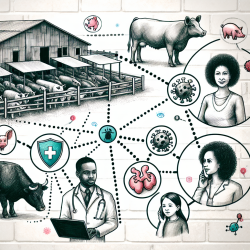Understanding Zoonotic Risks: A Guide for Practitioners
In the realm of public health, the emergence of zoonotic diseases poses significant challenges. These diseases, which can be transmitted from animals to humans, have been at the forefront of global health concerns, especially in the wake of the COVID-19 pandemic. The recent research article, A Public Health Ethics Case for Mitigating Zoonotic Disease Risk in Food Production, provides valuable insights into how intensive animal agriculture contributes to these risks and suggests policy measures to mitigate them.
The Role of Intensive Animal Agriculture
Intensive animal agriculture has been identified as a key contributor to the emergence of zoonotic diseases. This form of agriculture involves high-density animal farming, which can facilitate the spread of diseases between animals and humans. The research highlights three primary policy options to address these risks:
- Incentivizing Alternatives: Governments could subsidize plant-based and cell-based animal source food (ASF) alternatives, encouraging a shift away from traditional animal farming.
- Disincentivizing Intensive Production: Implementing a "zoonotic tax" on ASF products could reflect the true cost of zoonotic disease risks and discourage intensive farming practices.
- Eliminating Intensive Production: A total ban on intensive animal agriculture could be considered, although this approach requires careful consideration of economic and social impacts.
Implications for Practitioners
For practitioners, understanding these dynamics is crucial. By recognizing the link between intensive animal agriculture and zoonotic diseases, practitioners can better advocate for policies that protect public health. Here are some steps practitioners can take:
- Stay Informed: Keep up-to-date with the latest research on zoonotic diseases and public health policies.
- Advocate for Change: Use your platform to support policies that reduce zoonotic risks, such as promoting plant-based diets or supporting legislative changes.
- Educate Others: Share knowledge with colleagues, patients, and the community about the importance of mitigating zoonotic risks.
Encouraging Further Research
While the research provides a strong case for policy intervention, there is always room for further exploration. Practitioners are encouraged to engage in or support research that explores the effectiveness of proposed policies, the economic implications of shifting away from intensive animal agriculture, and the development of alternative food systems.
To read the original research paper, please follow this link: A Public Health Ethics Case for Mitigating Zoonotic Disease Risk in Food Production.










